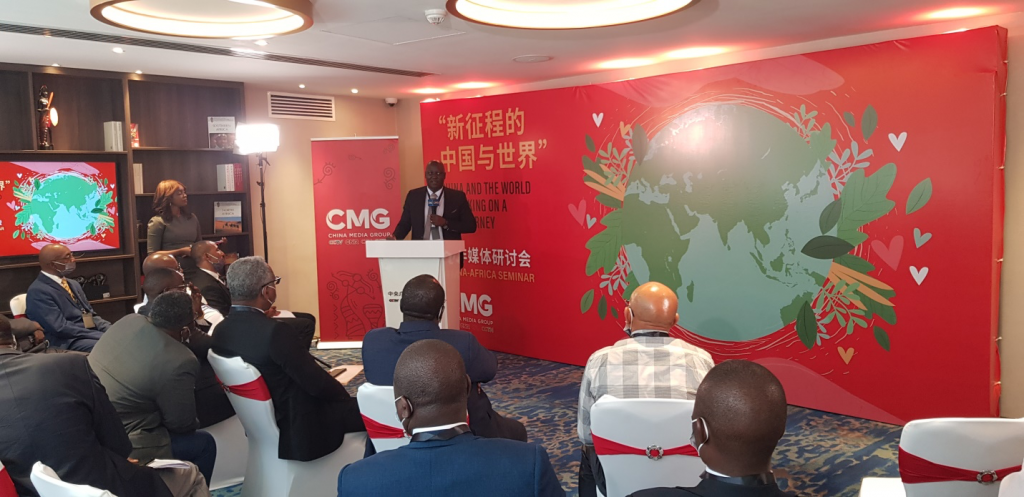Published: November 22,2022
By Gerald Mbanda

China Media Group (CMG) organized a meeting onNovember 16, 2022 in Nairobi Kenya which focused on how media organizations in China and Africa can collaborate for the benefit of the people of China and Africa. The hybrid annual meeting themed, “China embarking on a new journey” brought together media practitioners and scholars from China and various Africa countries.
China Africa Media cooperation in the 21st century is very important and forums like this organized by CMG between China and African countries are very important. China and Africa share a lot in common, be it in the past, present and the future. For example we share a common history of foreign interference. Today, the west claims to tell our story to the world more than we do. The current COVID-19 pandemic showed us that we need to cooperate whether rich or poor countries because no country could fight the pandemic alone. China lead the global fight against the pandemic and un like the west, declared COVID Vaccine a public good and shared with almost all Africa countries and beyond, at a time the west was hording more than they needed.
Building China –Africa community with a shared future has to be holistic and strengthen not only media cooperation but also diplomatically, socially, culturally etc. On the media front, there is need to own and tell our stories from an informed perspective rather than the biased, fake narrative carried by western media about Africa and China. Before thinking about building China- Africa community with a shared future, we must interrogate ourselves to find out whether China and Africa have had a shared past and present, which can help us then to predict the future.
PAST
History books recorded some early interactions between China and Africa through maritime trade dating back to the 2nd century. Historians believe that some of the silk that Cleopatra of Egypt wore came from China. There is Tang porcelains uncovered along the coast of Egypt, and the Chinese coins dating back to the nineth century excavated in places further south of the Sahara, cross ocean expeditions led by Admiral Zheng He in the 15th who reached the shores of East African coast.
In the 1960s, China helped African Liberation Movements to prepare their struggle for Independence. Tanzania was a training ground for most of these Liberation Movements.
The TAZARA railway built between 1968 and 1975 to link the Zambian copperbelt with the Indian Ocean. Called the “Freedom Railway” because it aimed to liberate Zambia from dependency on South Africa and Rhodesia, TAZARA was China’s largest development assistance project in Africa.
This historical friendship should not be taken for granted. It establishes who is the real friend in “NEED” for Africa. China supported struggling African countries for independence out of SACRIFICE, rather than out of abundance or gain.
On October 25, 1971, at the 26th UN African countries supported a resolution sponsored by Albania, Algeria, and 21 other countries, which decided to restore all the lawful rights of the People’s Republic of China in the United Nations and immediately expel the representatives of the Kuomintang clique from the United Nations and all its affiliated agencies.
PRESENT
It would be difficult to talk about building a China-Africa community with a shared future in the new journey, without a shared past and present. China and Africa have walked together in a shared past in good and bad. Our Media cooperation should promote this friendship to a new level, stronger against forces that are trying to dictate how to conduct our business, politically, economically, socially, culturally, etc. A friend of mine from EAC told me a story recently where the EU proposed a trade agreement on condition of supporting LGBT and abortion.
According to a survey done by the Center for the Future of Democracy at the University of Cambridge in the UK, China has for the first time overtaken the U.S. in the intellectual and political battle for the support of the populace in developing countries. The poll has shown that 62 percent of people in developing countries (among the 6.3 billion people living in 136 countries) hold favorable views toward China. It is an astonishing achievement for the country on account of China having accomplished so much since the reform and opening up in the late 1978 as well as the “GoGlobal” investment strategy initiated in 1999.
How come that China has become more appealing than its Western counterparts to the developing world within such a relatively short time span? The report has cited several reasons – including the “perceived democratic shortcomings” in Western liberal countries and conflicting values of the developing world with those of the West – behind China’s growing popularity among developing countries.
The report credited China’s increasing influence mostly on account of its economic engagements with developing countries through the Belt and Road Initiative (BRI), a massive project launched in 2013 and invested over $4 trillion into the 147 participating countries’ infrastructure, energy, and transportation projects. The report cited that among the 4.6 billion people living in countries supported by the BRI; almost two-thirds hold a positive view of China.
China’s growing global acceptance is rooted in its very political history. China hasn’t indulged in colonialism or the occupation of foreign territories. The evolving relationship with China is seen by many leaders of developing nations as a historic opportunity to escape neocolonial ties to the West.
China has taken huge pains in its decades-long journey toward being the world’s largest trading entity with Africa and the second-largest economy globally.Cooperation through the Forum for China Africa Cooperation (FOCAC) has created many opportunitiesfor Africa growth and development in various sectors. Both BRI and FOCAC programs complement the African Union agenda 2063, which is Africa’s master plan for transforming Africa into the global powerhouse of the future.
China offers win-win cooperation, allowing governments of developing countries to access its finance, expertise, and development aid without any conditions like interfering in political affairs of other countries.
The second survey I want to talk about was done by the UK-based YouGov-Cambridge Globalism Project, carried out this summer where 1,000 people in 25 African countries, including Kenya, Nigeria and South Africa, were interviewed. The survey showed that across the continent, China was widely seen as a force for good. In South Africa, 61 percent of respondents saw China’s influence in the world as positive, in Kenya the support for China was higher at 82 percent, and Nigeria was highest of the three, standing at 83 percent.
Bad reporting on Africa and China in western media
To western media Africa is a continent of misery: hunger disease, wars, unemployment etc.. Much progress taking place in Africa is selectively ignored. The Nairobi Express High way, the Standard gauge Railway much as they are very important for the development of Kenya, Western media remains silent. It does not fit into their Africa Agenda. Through our communication channels we can share topical issues where Africa and China have been misrepresented in foreign media.
We need to work together to shape the public opinion as well as fight misinformation on Africa and China. In recent years, “China Debt Trap” has made headlines in western media. Infrastructure developmental projectsunder Sino-Africa cooperation roads, railways, ports etc, are viewed in negative perspective yet they have improved economies and provided jobs in Africa. Kenya SGR is one among those mentioned that “china has taken over.” This is malicious campaign that should be challenged through our own media houses.
The claim of Human rights violations in Xinjiang province of China for example, is used as a political weapon meant to smear China’s image. Through Media cooperation, we can scratch each other’s back. When China is attacked, Africa should come for rescue and vice versa. Unlike western media, China media like in the same way like China’s foreign policy does not interfere in other country’s domestic issues of democracy and human rights.
We started Africa China Review publication first of all to tell the true story of Africa and China because it is distorted by western media. (Social media today) is very first interactive and sways public opinion. On the negative side, it carries a lot of misinformation and fake news. We have to be in this space to counter deliberate distortions and lies on Africa and China.
FUTURE
Through this meeting, CMG is taking the lead to operationalize China-Africa vision 2035, which aims at strengthening media cooperation in various fields, like capacity building, content sharing etc. This will not only help our professionals to do better their work, but it will be an opportunity for exchange visits for experience sharing, cultural and civilization understanding, networking, and promoting people to people diplomacy.
Our media houses, institutions should enhance people to people diplomacy through cultural exchanges, training workshops and experience sharing forums. We need African people to travel to China and Vice versa. Our media should champion and promote China-Africa Cooperation and take an active role in build a China-Africa community with a shared future in the new Era.
 Africa -China Review Africa -China Cooperation and Transformation
Africa -China Review Africa -China Cooperation and Transformation
